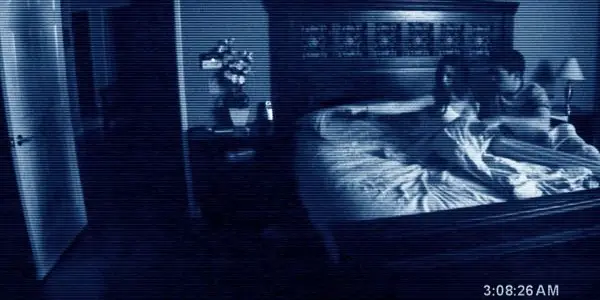In 2007, director Oren Peli spawned the multi-film, multi-million-earning Paranormal Activity franchise. Nearly thirteen years later, there have been six more releases in the series, with a seventh in the works for 2020. Peli’s creation has become one of the most successful horror film series of all time, and its rise from low-budget movie to Hollywood blockbuster can be (at least in part) attributed to its innovative use of viral marketing.
Cheap and Fearful
The first Paranormal Activity film used realism as a device to create fear and horror. A fixed camera position captured the goings on of a normal family, and a large amount of what makes the film scary, is the believability and verisimilitude.

This was an artistic, but also financial decision by the filmmaker. With a budget of around fifteen-thousand dollars, Peli did not have a huge camera crew with perfect equipment, so this still of cinematography allowed him to generate fear, without the cheap, low-budget feel.
Paranormal Activity had a production based around efficiency of spending, with stationary camerawork, low-budget effects and relatively unknown actors such as Katie Featherston and Micah Sloat. This allowed the production company (Blumhouse Productions) to save money, whilst still affording the filmmaker the ability to create the realistic and natural feel that he desired.
Screamfest
This lack of funding meant that the marketing team had to be creative, and specific in targeting their audience. One way in which they did this was by screening the film at L.A. horror film festival Screamfest. Generating a core audience base of horror film fans was a logical strategy for Paranormal Activity’s marketing team, who knew they needed to win over hard-core fans of the genre.
At the festival, the film had a huge amount of success, with Featherston winning best actress, and the film’s popularity amongst fans and critics increasing. Paranormal Activity was gaining a reputation that it would later capitalise on, with a fresh new marketing campaign.
Demand It!
It could be argued that the ‘Demand It!’ campaign, created by the marketing team of Paranormal Activity, gave birth to the film industry phenomenon of online viral marketing. This concept transformed what was expected of and possible for film advertising and publicity, moving on from an age of trailers, posters and star interviews.
The ‘Demand It!’ campaign was created as a way of maximising the potential of their distribution plan. A website was set up, on which fans (who had most likely been to or heard of the film because of Screamfest) to vote for the film to be screened in their local cinema. This meant that whichever cinemas across the United States got the most ‘Demand It!’ votes, the film would be distributed to, and screened in.
This gave the audience the power of distribution, and allowed the producers to know for certain where their film had an audience. They had an objective guarantee that the film would have a fanbase in certain areas, making their distribution choices much easier to make. With fifteen-thousand dollars, they did not have the finances to take risks, therefore this technique allowed for almost certain returns in certain areas.
Another way in which the audience were involved in the film’s marketing was through the film’s Twitter account. This was set to @TweetYourScream during the film’s release, and invited fans to tweet pictures of them and their friends being frightened. Once again, this put the marketing emphasis on the film’s spectators.
Internet Innovation
The ‘Demand It!’ campaign marked a shift in the way film marketers used the internet. Its full potential was finally starting to be optimised. Paranormal Activity’s interactive campaign was shared around the web by its own users, allowing the audience of the film to market itself, and creating a word-of-mouth like advertising system around the country. Using real audience members to spread the word about an upcoming film was unheard of at the time, and creating a competitive marketing system that made the fans do the work, proved to be a hugely rewarding system for the producers.
Blumhouse Productions had created an online sensation, which kicked the film into mainstream attention. This lead to a huge moment in the film series’ history, as Steven Spielberg agreed to be involved in the film’s DVD release. His input, as well as distribution from Paramount across the United States in 2009, meant that the film managed to bring in nearly two-hundred million dollars in box office revenue, making it one of the most profitable films in the history of cinema.
Other film marketing teams saw this success, and before long viral marketing schemes like ‘Demand It!’ would be a staple of modern film advertising. Campaigns like The Dark Knight (Christopher Nolan, 2008) used viral scavenger hunts (advertised through social media) to get the audience actively involved in the film’s marketing. This type of online campaign can only be traced back to Paranormal Activity.
Over a decade since its release, we can now see how influential it has been, both cinematically, and industrially.
What was the first online viral marketing campaign you got involved in?
Paranormal Activity is now streaming on Netflix.
Does content like this matter to you?
Become a Member and support film journalism. Unlock access to all of Film Inquiry`s great articles. Join a community of like-minded readers who are passionate about cinema - get access to our private members Network, give back to independent filmmakers, and more.